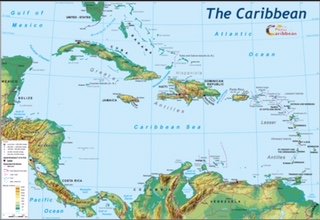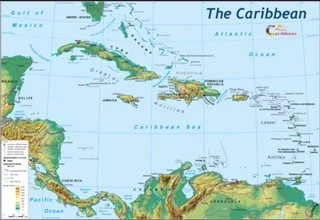The Netherlands and the Caribbean share a long and significant history, spanning colonial rule, trade, cultural influence, and modern cooperation. Unlike many European powers that fully decolonized, the Dutch still maintain a direct presence in the Caribbean through constituent countries and special municipalities, making the Netherlands an active participant in Caribbean affairs today.
Dutch Caribbean Territories
The Netherlands still governs six territories in the Caribbean, divided into two groups:
1. The Dutch Constituent Countries (Part of the Kingdom of the Netherlands)
• Aruba
• Curaçao
• Sint Maarten
These islands are autonomous but remain under the Kingdom of the Netherlands for defense, foreign policy, and constitutional matters. They each have their own governments but maintain strong economic, political, and cultural ties with the Netherlands.
2. Dutch Special Municipalities (Directly governed by the Netherlands)
• Bonaire
• Sint Eustatius
• Saba
These islands are integrated as municipalities of the Netherlands, meaning they use Dutch laws, receive Dutch financial aid, and follow the euro (€) as currency.
Historical Ties: The Dutch Colonial Era and Trade
The Dutch first arrived in the Caribbean in the early 17th century, establishing settlements and trade routes. Some key moments in Dutch-Caribbean history include:
• Dutch West India Company (WIC): This powerful trading company controlled sugar plantations, salt mining, and slave trade routes across the Caribbean.
• Slave Trade and Plantations: The Dutch played a significant role in the transatlantic slave trade, transporting enslaved Africans to the Caribbean to work on plantations.
• Curacao as a Trade Hub: Willemstad, Curaçao, became an important commercial center, connecting Europe, Africa, and the Americas.
• Anglo-Dutch Rivalry: The Dutch fought the British and Spanish for control of Caribbean islands, leading to shifting territories over the centuries.
Cultural Influence: A Unique Blend of Dutch and Caribbean Traditions
The Dutch Caribbean is a melting pot of Dutch, African, Indigenous, and Latin American influences, resulting in a rich cultural identity seen in language, food, and traditions.
• Languages:
• Papiamento (in Aruba, Bonaire, Curaçao) – A unique Creole language mixing Portuguese, Spanish, Dutch, and African influences.
• Dutch (official language) – Still used in education, government, and business.
• English (in Sint Maarten, Saba, Sint Eustatius) – More commonly spoken than Dutch in daily life.
• Cuisine:
• Dutch-Caribbean dishes blend European and Caribbean flavors, featuring foods like keshi yena (stuffed cheese dish), stoba (Caribbean stew), and pastechi (savory pastries).
• Dutch snacks like bitterballen (deep-fried meatballs) and poffertjes (mini pancakes) are also popular.
• Music and Festivals:
• Tambú: A traditional Afro-Caribbean music and dance form rooted in resistance and celebration.
• Carnival: A major festival in Dutch Caribbean islands, featuring parades, colorful costumes, and lively music.
Economic and Diplomatic Partnerships
The Netherlands remains an important economic and political partner for both its territories and independent Caribbean nations.
1. Trade and Investment
• The Dutch Caribbean serves as a financial and trade hub, particularly in Curaçao and Aruba, which host offshore banking and shipping industries.
• The Netherlands is a key trading partner for Caribbean nations, particularly in agriculture, energy, and tourism.
2. Tourism and Infrastructure
• The Netherlands supports tourism development in its territories, helping boost local economies.
• Dutch companies have invested in infrastructure projects, including airports, ports, and renewable energy projects.
3. Development Aid and Disaster Relief
• The Netherlands provides financial aid and disaster relief, especially for islands hit by hurricanes (e.g., the 2017 devastation of Sint Maarten by Hurricane Irma).
• Dutch assistance focuses on education, healthcare, and sustainable development.
4.Regional Cooperation
• The Netherlands is involved in Caribbean regional organizations, such as the Caribbean Community (CARICOM) and the Association of Caribbean States (ACS).
• Dutch-Caribbean islands work closely with neighboring Caribbean nations on trade, security, and environmental issues.
The Dutch-Caribbean Relationship Today
In the modern era, the Netherlands continues to play a role in Caribbean affairs, balancing historical ties, economic interests, and political relationships. While there have been debates over independence movements in some Dutch territories, many islands maintain close ties with the Netherlands for economic stability and governance support.
At the same time, the Netherlands also collaborates with independent Caribbean nations, helping promote regional trade, climate resilience, and cultural exchanges.
The Dutch connection to the Caribbean is one of deep historical roots, unique cultural exchanges, and ongoing economic and diplomatic cooperation. Whether through language, trade, governance, or tourism, the ties between the Netherlands and the Caribbean remain strong and continue to evolve.
As the region faces new challenges and opportunities, the Dutch-Caribbean relationship will continue to adapt, ensuring a lasting bond between the Netherlands and the Caribbean islands.




